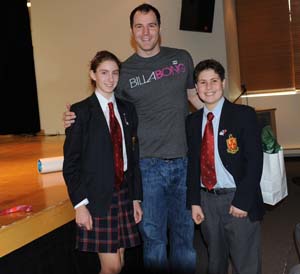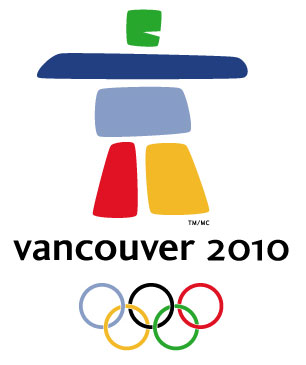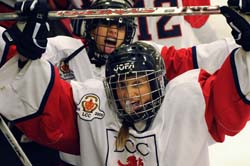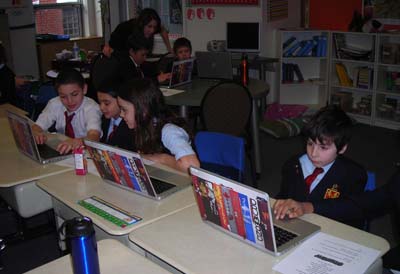Voici des extraits de commentaires d’élèves de 7e année après la visite de Yanick Lupien.
 L’olympien Yannick Lupien est venu rendre visite à Lower Canada College le mardi 13 avril 2010. C’était une superbe idée car il m’a inspiré à travailler plus fort pour avoir ce que je veux dans la vie. J’ai aussi aimé sa détermination pour devenir un nageur olympique et un pompier. Il m’a montré que si tu veux réaliser tes rêves dans la vie, il faut que tu travailles fort. Je ne le croyais presque pas quand il nous a dit que toute sa carrière a commencé parce que sa mère a acheté une maison avec une piscine creusée et elle voulait qu’il apprenne à nager. Yannick Lupien est, et va toujours être une grande inspiration pour moi. —Adrien Perlinger ’14
L’olympien Yannick Lupien est venu rendre visite à Lower Canada College le mardi 13 avril 2010. C’était une superbe idée car il m’a inspiré à travailler plus fort pour avoir ce que je veux dans la vie. J’ai aussi aimé sa détermination pour devenir un nageur olympique et un pompier. Il m’a montré que si tu veux réaliser tes rêves dans la vie, il faut que tu travailles fort. Je ne le croyais presque pas quand il nous a dit que toute sa carrière a commencé parce que sa mère a acheté une maison avec une piscine creusée et elle voulait qu’il apprenne à nager. Yannick Lupien est, et va toujours être une grande inspiration pour moi. —Adrien Perlinger ’14
Yannick Lupien m’a impressionné. Quand je l’ai vu rentrer dans le Chamandy, il était tout content de nous parler. J’étais impressionné par ses histoires; il se levait tous les matins à 5 h pour nager, ensuite aller à l’école, et finalement nager après l’école. Je pense qu’il est cool et il est devenu mon idole. Je vais prendre ses conseils et suivre mon rêve : jouer dans la LNH. —Zack Bélanger ’14
Je trouve que la présentation était très cool parce qu’il nous a expliqué des choses importantes, en même temps, il est drôle et amusant. Il est allé aux Jeux Olympiques deux fois et a nagé avec l’excellent Michael Phelps. Yannick est très costaud, il mesure 6 pieds 5 et il vient d’une ville appelée Elmer. Je vais toujours me souvenir de cette présentation. —Alex Desgagnes ’14
Yannick m’a appris de ne jamais abandonner nos rêves. —Kevin Ly ’14
Avec son enthousiasme et son charisme il nous a encouragé à toujours faire de notre mieux. Il nous a dit de continuer et de ne jamais arrêter une activité même si tu n’es pas le meilleur. Avec ces mots inspirants, plusieurs enfants vont continuer de poursuivre leurs rêves. Qui sait, peut-être quelqu’un en septième année ira aux olympiques! —Victoria Van Ryswyk ’14
J’ai vraiment adoré l’écouter parler. J’ai beaucoup appris de lui, ça m’a permis d’apprécier tout ce que j’ai. Quand il a parlé de ses difficultés pour nager tous les jours avant l’école, j’étais tellement surprise. Normalement, pour moi, quand je nage une longueur, je suis si fatiguée que je m’arrête tout de suite. Il m’a appris de ne jamais abandonner. Bien sûr, je ne vais pas nager 10 kilomètres, mais faire du mieux que je peux! —Kaitlin Markus ’14
J’ai vraiment aimé son discours. Il a vraiment ouvert mes yeux sur mon futur. Il nous a expliqué comment bien réussir à l’école et de ne pas abandonner nos rêves. Je serais content s’il revenait nous parler. —Eric Tellier ’14
Yannick Lupien est un homme très gentil et inspirant. Il a dit, « Quand vous travaillez pour quelque chose, vous êtes récompensé ». Même quand on se moquait de lui, il a continué à travailler très fort. Il était très chanceux d’avoir une famille qui le supportait. Il racontait toujours des blagues qui nous faisaient rire. Yannick est vraiment un champion. — Sonia Toy ’14
Il m’a tellement inspiré que je suis encore sous le choc. Il nage environ 10 km par jour, tous les jours! Après avoir célébré la nouvelle année avec notre famille et nos amis, il nage! En plus d’être un nageur professionnel, il est également pompier. Il sauve des vies, nage, il persévère (même avec une infection aux oreilles) et gagne sa course, c’est une source d’inspiration. —Claudia Melka ’14
M. Lupien nous a expliqué que rien n’est facile, il faut travailler pour obtenir ce que tu veux. Il a aussi mentionné que même si des gens se moquent de toi à cause de ton sport, il ne faut pas arrêter de faire ce que tu aimes. Il faut toujours croire en toi, même si les autres doutent. J’ai beaucoup appris de sa présentation. C’est une personne qui motive beaucoup les jeunes. —Luca Saputo ’14
J’ai pensé que la présentation était extraordinaire. Yannick m’a fait beaucoup rire, il m’a également montré qu’il ne faut jamais abandonner. Il donne son 100% chaque fois, il ne lâche jamais. —Nathan Reid ’14
Une personne très sage a dit : « Dans la vie, les trois choses dont vous avez besoin pour réussir sont; la persévérance, la persévérance et la persévérance. ». Cette personne fantastique, a réussi à motiver les adolescents, ce qui est une chose de très difficile à accomplir! Je m’appelle Lola Flomen ’14, et mon héros est Yannick Lupien.



